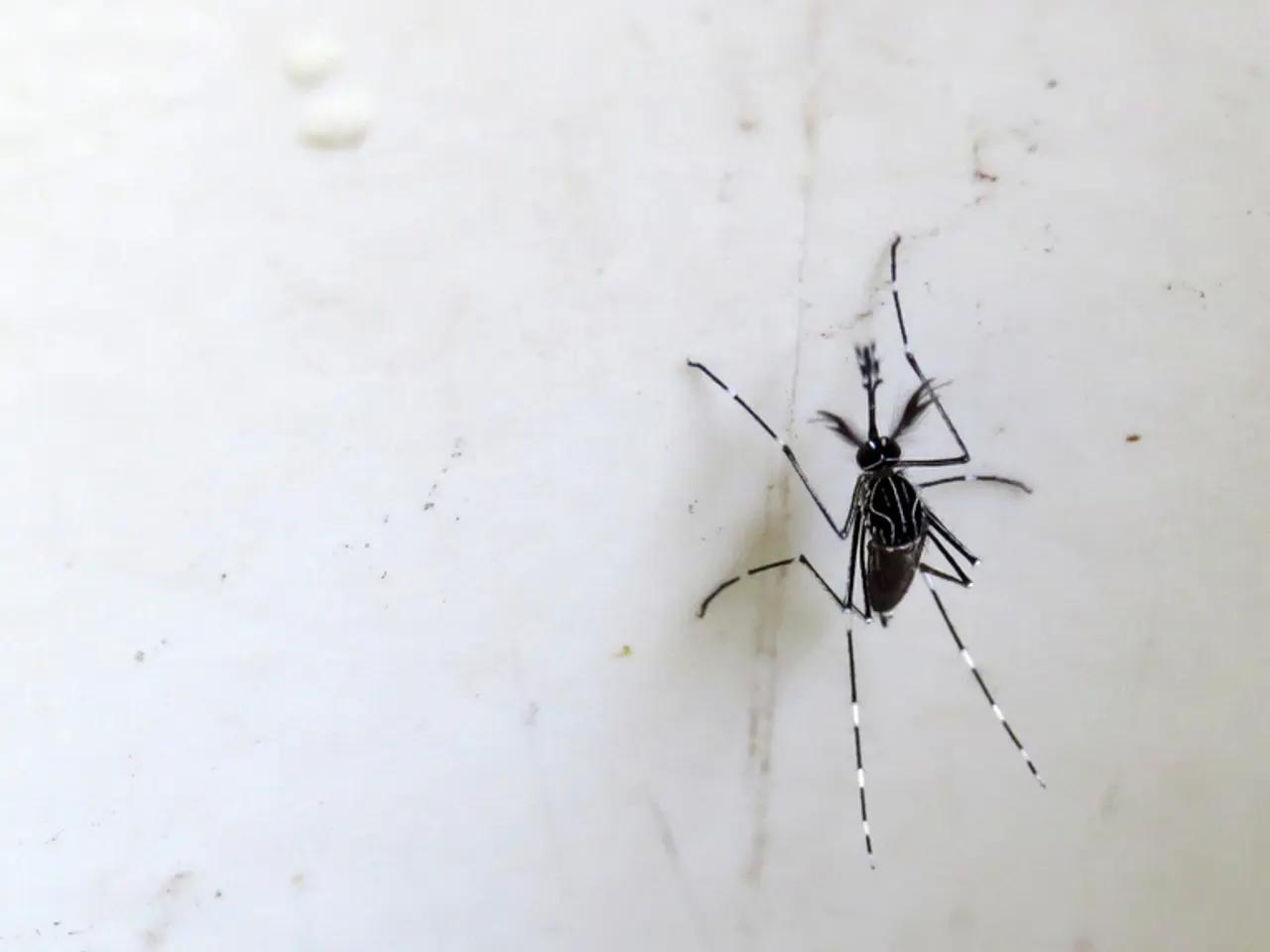Tiger mosquito and Chikungunya virus threat on Upper Rhine: Examining potential danger
In a significant development, a live Chikungunya vaccine was approved in 2024, with a dead vaccine becoming available early in 2025. This comes as the Chikungunya virus, detected in 119 countries according to the World Health Organization (WHO), poses a growing threat, particularly in Europe.
The Asian tiger mosquito, a carrier of the Chikungunya virus among others, has established populations in parts of Germany, including the Stuttgart region. Despite not carrying the virus inherently, this mosquito can transmit diseases if it bites an infected traveler and subsequently bites another person.
Fatalities from the Chikungunya virus are rare, occurring in one in 1,000 people. However, the symptoms can persist for weeks, months, or even years, especially in the joints. Infected people often experience high fever and strong joint pain, which usually affects the hands and joints symmetrically.
Authorities in France have already dealt with 25 cases of the Chikungunya virus on the mainland this year. In response, French authorities in Strasbourg sprayed an insecticide in 2024 after two travelers returning from abroad were diagnosed with dengue fever, another disease transmitted by the Asian tiger mosquito.
In Germany, public health experts emphasize preventive measures, including mosquito repellents for travelers returning from endemic areas and community efforts to eliminate standing water where mosquitoes breed. Current measures in Germany, particularly in Stuttgart, include public monitoring, targeted on-site control by specialized companies, public information campaigns, and citizen involvement.
These efforts aim to reduce the population density of the mosquito and thereby lower the risk of transmission of tropical diseases such as chikungunya, dengue, and Zika. Biologist Hans Jerrentrup is fighting the Asian tiger mosquito on behalf of municipalities, deploying a biological control agent BTI in Ketsch, a community south of Mannheim, to kill the larvae of the Asian tiger mosquitoes.
However, many municipalities can no longer afford professional control of the Asian tiger mosquito. Kehl, a city directly on the French border, has given up its fight against the mosquito and relies on the help of citizens. The city of Kehl has a large population of Asian tiger mosquitoes, which is partly due to its proximity to the A5 highway.
The Standing Committee on Vaccination for Travelers to Tropical Regions has recommended a Chikungunya vaccination for adults since early July 2025. The name Chikungunya comes from a phrase that means "the bent walker" in translation, reflecting the debilitating joint pain experienced by many infected individuals.
Local outbreaks of Chikungunya are increasingly likely in Germany. As the mosquito's adaptability and the influence of climate change pose ongoing challenges, continued vigilance and expanded control efforts remain necessary to prevent outbreaks such as chikungunya. The Asian tiger mosquito originally comes from French overseas territories, and travelers often bring it to the mainland. Unfortunately, there is no medication against the Chikungunya virus.
- Science continues to make significant strides, with a live Chikungunya vaccine approved in 2024, furthering the field of workplace-wellness.
- Medical conditions such as Chikungunya have gained attention in the health-and-wellness industry due to their global impact.
- Chronic diseases like Chikungunya demand our attention, as they pose threats to our cardiovascular health.
- Cancer researchers are not the only ones battling diseases; efforts against respiratory conditions like Chikungunya are equally crucial.
- Digestive-health practitioners should also be aware of Chikungunya, given its potential impact on the overall health of individuals.
- Eye-health professionals cannot ignore the potential implications of Chikungunya on vision and eye health.
- Hearing specialists need to consider Chikungunya in their diagnoses, as it may have auditory effects.
- Fitness and exercise play a vital role in boosting the immune system, aiding the body in combating diseases like Chikungunya.
- Sexual-health clinics should educate themselves on Chikungunya and its potential sexual transmission to offer comprehensive care.
- Autoimmune disorders, including Chikungunya, require nuanced understandings to provide effective therapies-and-treatments.
- Climate change is a pressing concern that impacts numerous environmental-science domains, including mosquito-borne diseases like Chikungunya.
- Mental-health professionals must address the stress and anxiety triggered by diseases like Chikungunya in their patients.
- Mens-health specialists should incorporate knowledge of Chikungunya into their practices to ensure holistic care.
- Skin-care experts should be aware of possible skin-conditions resulting from Chikungunya to offer appropriate treatments.
- CBD, a promising compound in the medical field, may hold potential for treating symptoms associated with Chikungunya.
- Neurological-disorders, including Chikungunya, demand ongoing research to better understand their causes and develop effective treatments.
- Environmental-science researchers should study the impact of Chikungunya on various ecosystems and its potential links to climate change.
- Finance plays a crucial role in funding research for diseases like Chikungunya, ensuring that medical conditions receive necessary attention and resources.
- In the realm of finance, investments in medical research projects combating diseases like Chikungunya can yield considerable returns.
- Wealth-management strategies must consider potential health risks, such as Chikungunya, when planning for long-term financial security.
- Home-and-garden enthusiasts can help in the fight against mosquitoes by eliminating standing water, serving as active participants in community health efforts.
- Businesses, particularly in the travel industry, should remain vigilant about disease outbreaks, like Chikungunya, to protect their customers.
- Medicare should prioritize Chikungunya treatment for the elderly, as they are more susceptible to its serious effects.
- CBD oil has gained popularity in the food-and-drink sector as a potential natural remedy for managing symptoms related to Chikungunya.
- Food-and-drink companies can play a role in educating the public about Chikungunya and promoting prevention measures, such as mosquito repellents.
- In the ever-changing landscape of technology, artificial-intelligence could aid in predicting disease outbreaks like Chikungunya and recommending preventive measures.
- Relationships, be they personal or professional, can influence our behavior and adherence to health practices, such as those focused on Chikungunya prevention.
- Pets and travelers can unknowingly transport the Asian tiger mosquito across borders, emphasizing the importance of awareness and education in pet-owning communities.




